GALLUP NEWS SERVICE
PRINCETON, NJ -- As the National Association for the Advancement of Colored People (NAACP) meets in Milwaukee this week for its 96th annual convention, Gallup's annual Minority Rights and Relations poll reports both encouraging and not so encouraging attitudes about relations between whites and blacks in the United States.
The June 6-25, 2005, survey includes large oversamples of blacks and Hispanics that allow for statistically reliable analyses of their views, in addition to the views of non-Hispanic whites.
On the positive side, most Americans are upbeat when asked to rate the quality of overall relations between whites and blacks. Roughly two-thirds of Americans -- including majorities of whites and blacks -- believe these inter-race relations are "very" or "somewhat" good.
Public perceptions of how well whites and blacks get along are about the same as perceptions of white-Hispanic relations. Seventy percent of Americans describe relations between whites and Hispanics as either very or somewhat good. By comparison, Americans are slightly more likely to think that whites and Asians have good relations (79%). Americans are somewhat less likely to believe that blacks and Hispanics get along (56%).
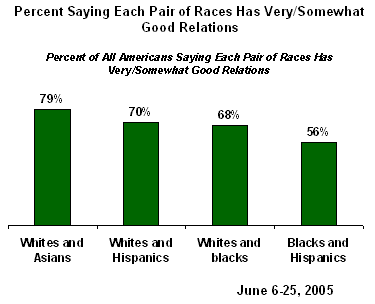
A separate question finds that a majority of Americans believe only a few whites and blacks dislike members of the other race. However, a substantial number disagrees: 43% of blacks say that many or all white people dislike blacks. Similarly, 41% of whites say that many or all black people dislike whites.
A slightly higher level of discouragement is evident in a question asking whether relations between whites and blacks will "always be a problem" or whether "a solution will eventually be worked out." Just half of all Americans believe the country will work out relations between whites and blacks; nearly as many (46%) believe race relations will pose a persistent problem.
A Closer Look at Race Relations Ratings
Roughly two-thirds (68%) of the nation's adults describe black-white relations as very or somewhat good; only 29% consider them very or somewhat bad.
Majorities of blacks and whites perceive relations between the two groups positively. Hispanics are a bit less positive in their assessment.
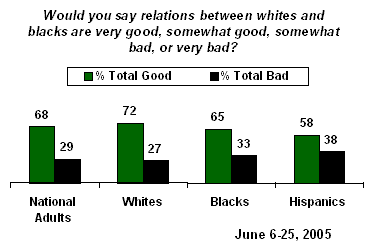
Ratings of relations between whites and Hispanics and between whites and Asians are also positive:
- Seventy percent of adults say that relations between whites and Hispanic are either very or somewhat good. This includes 73% of whites, 67% of Hispanics, and 61% of blacks saying that relations between whites and Hispanics are good.
- Overall, nearly 8 in 10 Americans say that white-Asian relations are good. This includes 81% of whites, 72% of blacks, and 73% of Hispanics saying white-Asian relations are good.
Black-Hispanic relations are a potential difficulty for the country today. Black-Hispanic relations receive less positive reviews than black-white relations, in part because a significant minority of Hispanics (40%) perceive trouble in this area. By contrast, most blacks (77%) believe black-Hispanic relations are good; only 16% consider them bad. A significant minority of whites (32%) also think black-Hispanic relations are bad.
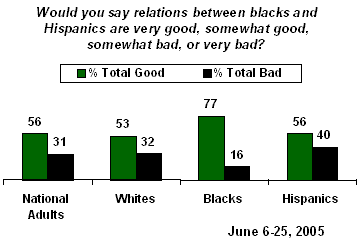
Close to Half Think Black-White Tensions Will Persist
Despite Americans' generally positive assessment of white-black relations today, when asked specifically "Do you think that relations between blacks and whites will always be a problem for the United States, or that a solution will eventually be worked out?", 46% of Americans take the pessimistic view. Half say "a solution will eventually be worked out."
While white Americans are a little more optimistic than pessimistic about the outlook for race relations (51% believe there will eventually be a solution, 46% disagree), blacks are considerably more negative (57%) than positive (41%).
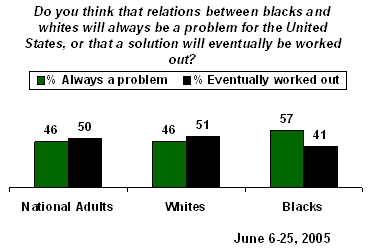
The long-term trend on this question shows that Americans were most optimistic about resolving black-white tensions when polling began on this question in 1963. Gallup found more negative attitudes during much of the 1990s, a decade marked by the Rodney King incident, the Los Angeles riots, and the O.J. Simpson murder trial. Since 2001, perceptions have been about evenly divided.
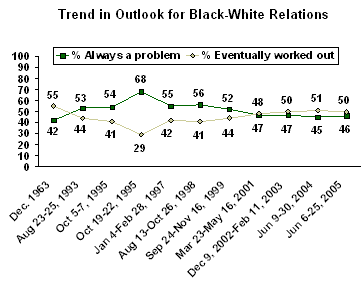
Many Perceive Racial Enmity
The "cup is half empty or half full" conundrum regarding race relations is perhaps most evident in a question asking Americans to estimate the extent of hostility between whites and blacks. On the one hand, a majority of blacks believe that only a few whites dislike blacks. Also, a majority of whites believe that only a few blacks dislike whites.
But depending on one's perspective, the fact that a sizeable minority of people perceive widespread bigotry could be troubling. More than one-third of U.S. adults believe that many or almost all white people dislike blacks; 34% of whites and 43% of blacks hold this view.
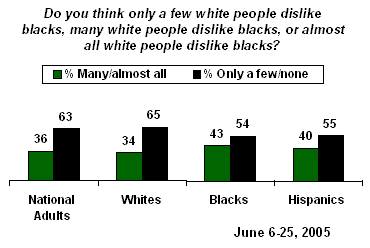
Similarly, 4 in 10 Americans believe that many or all blacks dislike whites. Whites and Hispanics are slightly more likely than blacks to hold this view.
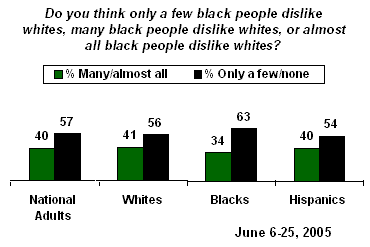
Gallup first asked these questions in 1992. Since then, there has been little change in perceptions of how whites feel about blacks, but perceptions of blacks' feelings toward whites have increased. In 1992 and 1995 -- spanning the King and Simpson controversies -- more than half of Americans perceived widespread animosity by blacks toward whites. This gradually improved as of 1996, and by June 1998, attitudes were more positive than negative. The balance of opinion today remains more positive than negative.
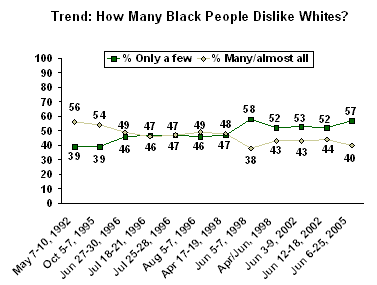
Survey Methods
These results are based on telephone interviews with a randomly selected national sample of 1,375 adults, aged 18 years and older, including a main sample of 1,004 national adults and oversamples of blacks and Hispanics. Telephone interviews were conducted from June 6-25, 2004.
For results based on the total sample of 2,264 national adults, one can say with 95% confidence that the maximum error attributable to sampling and other random effects is ±5 percentage points.
Results based on the subsample of whites include interviews with 807 non-Hispanic white adults and have a maximum margin of sampling error of ±7 percentage points. Results based on the subsample of blacks include interviews with 802 black national adults and have a maximum margin of sampling error of ±5 percentage points. Results based on the subsample of Hispanics include interviews with 511 Hispanic national adults (including 181 conducted in Spanish) and have a maximum margin of sampling error of ±7 percentage points.
In addition to sampling error, question wording and practical difficulties in conducting surveys can introduce error or bias into the findings of public opinion polls.9. Next, we'd like to know how you would rate relations between various groups in the United States these days. Would you say relations between -- [RANDOM ORDER] -- are very good, somewhat good, somewhat bad, or very bad?
A. Whites and blacks
|
Very |
Somewhat good |
Somewhat bad |
Very |
No |
|
|
Total |
% |
% |
% |
% |
% |
|
2005 Jun 6-25 |
11 |
57 |
23 |
6 |
3 |
|
2004 Jun 9-30 |
13 |
59 |
20 |
6 |
2 |
|
2003 Jun 12-18 |
10 |
58 |
24 |
6 |
2 |
|
2002 Jun 3-9 |
8 |
61 |
23 |
5 |
3 |
|
2001 Jun 11-17 |
6 |
57 |
28 |
7 |
2 |
|
|
|
|
|
|
|
|
Non-Hispanic Whites |
|
|
|
|
|
|
2005 Jun 6-25 |
11 |
61 |
22 |
5 |
1 |
|
2004 Jun 9-30 |
13 |
61 |
20 |
5 |
1 |
|
2003 Jun 12-15 |
10 |
59 |
25 |
5 |
1 |
|
2002 Jun 3-6 |
7 |
63 |
24 |
3 |
3 |
|
2001 Jun 11-17 |
6 |
56 |
30 |
6 |
2 |
|
|
|
|
|
|
|
|
Blacks |
|
|
|
|
|
|
2005 Jun 6-25 |
10 |
55 |
20 |
13 |
2 |
|
2004 Jun 9-30 |
12 |
56 |
21 |
8 |
3 |
|
2003 Jun 12-18 |
9 |
50 |
26 |
13 |
2 |
|
2002 Jun 3-9 |
9 |
59 |
18 |
13 |
1 |
|
2001 Jun 11-17 |
8 |
62 |
17 |
11 |
2 |
|
|
|
|
|
|
|
|
Hispanics |
|
|
|
|
|
|
2005 Jun 6-25 |
11 |
47 |
27 |
11 |
4 |
|
2004 Jun 9-30 |
12 |
49 |
21 |
10 |
8 |
|
2003 Jun 12-18 |
11 |
57 |
19 |
9 |
4 |
|
2002 Jun 3-9 |
9 |
53 |
25 |
9 |
4 |
|
2001 Jun 11-17 |
8 |
57 |
18 |
14 |
3 |
B. Whites and Hispanics
|
Very |
Somewhat good |
Somewhat bad |
Very |
No |
|
|
Total |
% |
% |
% |
% |
% |
|
2005 Jun 6-25 |
11 |
59 |
23 |
3 |
4 |
|
2004 Jun 9-30 |
13 |
61 |
19 |
4 |
3 |
|
2003 Jun 12-18 |
12 |
61 |
20 |
4 |
3 |
|
2002 Jun 3-9 |
7 |
61 |
22 |
5 |
5 |
|
2001 Jun 11-17 |
7 |
59 |
26 |
4 |
4 |
|
|
|
|
|
|
|
|
Non-Hispanic Whites |
|
|
|
|
|
|
2005 Jun 6-25 |
10 |
63 |
24 |
1 |
2 |
|
2004 Jun 9-30 |
12 |
62 |
20 |
4 |
2 |
|
2003 Jun 12-15 |
11 |
61 |
22 |
3 |
3 |
|
2002 Jun 3-6 |
7 |
61 |
23 |
4 |
5 |
|
2001 Jun 11-17 |
6 |
61 |
25 |
4 |
4 |
|
|
|
|
|
|
|
|
Blacks |
|
|
|
|
|
|
2005 Jun 6-25 |
11 |
50 |
22 |
6 |
11 |
|
2004 Jun 9-30 |
12 |
50 |
22 |
4 |
12 |
|
2003 Jun 12-18 |
9 |
52 |
24 |
6 |
9 |
|
2002 Jun 3-9 |
8 |
52 |
21 |
11 |
8 |
|
2001 Jun 11-17 |
7 |
48 |
28 |
9 |
8 |
|
|
|
|
|
|
|
|
Hispanics |
|
|
|
|
|
|
2005 Jun 6-25 |
16 |
51 |
21 |
10 |
2 |
|
2004 Jun 9-30 |
20 |
56 |
16 |
3 |
5 |
|
2003 Jun 12-18 |
16 |
68 |
10 |
5 |
1 |
|
2002 Jun 3-9 |
10 |
66 |
14 |
6 |
4 |
|
2001 Jun 11-17 |
14 |
55 |
21 |
7 |
3 |
C. Whites and Asians
|
Very |
Somewhat good |
Somewhat bad |
Very |
No |
|
|
Total |
% |
% |
% |
% |
% |
|
2005 Jun 6-25 |
20 |
59 |
12 |
1 |
8 |
|
2004 Jun 9-30 |
23 |
58 |
9 |
4 |
6 |
|
2003 Jun 12-18 |
20 |
62 |
11 |
2 |
5 |
|
2002 Jun 3-9 |
14 |
63 |
14 |
2 |
7 |
|
2001 Jun 11-17 |
14 |
62 |
15 |
4 |
5 |
|
|
|
|
|
|
|
|
Non-Hispanic Whites |
|
|
|
|
|
|
2005 Jun 6-25 |
21 |
60 |
13 |
* |
6 |
|
2004 Jun 9-30 |
24 |
60 |
9 |
4 |
3 |
|
2003 Jun 12-15 |
19 |
64 |
11 |
2 |
4 |
|
2002 Jun 3-6 |
13 |
64 |
15 |
2 |
6 |
|
2001 Jun 11-17 |
13 |
64 |
16 |
2 |
5 |
|
|
|
|
|
|
|
|
Blacks |
|
|
|
|
|
|
2005 Jun 6-25 |
16 |
56 |
11 |
3 |
14 |
|
2004 Jun 9-30 |
16 |
52 |
13 |
4 |
15 |
|
2003 Jun 12-18 |
19 |
55 |
15 |
2 |
9 |
|
2002 Jun 3-9 |
12 |
60 |
13 |
5 |
10 |
|
2001 Jun 11-17 |
14 |
52 |
20 |
4 |
10 |
|
|
|
|
|
|
|
|
Hispanics |
|
|
|
|
|
|
2005 Jun 6-25 |
17 |
56 |
11 |
5 |
11 |
|
2004 Jun 9-30 |
25 |
47 |
8 |
5 |
15 |
|
2003 Jun 12-18 |
19 |
57 |
9 |
3 |
12 |
|
2002 Jun 3-9 |
18 |
56 |
11 |
4 |
11 |
|
2001 Jun 11-17 |
8 |
57 |
18 |
8 |
9 |
D. Blacks and Hispanics
|
Very |
Somewhat good |
Somewhat bad |
Very |
No |
|
|
Total |
% |
% |
% |
% |
% |
|
2005 Jun 6-25 |
9 |
47 |
26 |
5 |
13 |
|
2004 Jun 9-30 |
9 |
53 |
20 |
6 |
12 |
|
2003 Jun 12-18 |
10 |
50 |
26 |
4 |
10 |
|
2002 Jun 3-9 |
7 |
46 |
26 |
7 |
14 |
|
2001 Jun 11-17 |
6 |
43 |
30 |
9 |
12 |
|
|
|
|
|
|
|
|
Non-Hispanic Whites |
|
|
|
|
|
|
2005 Jun 6-25 |
7 |
46 |
28 |
4 |
15 |
|
2004 Jun 9-30 |
6 |
52 |
21 |
6 |
15 |
|
2003 Jun 12-15 |
7 |
48 |
29 |
4 |
12 |
|
2002 Jun 3-6 |
4 |
42 |
30 |
7 |
17 |
|
2001 Jun 11-17 |
4 |
38 |
34 |
10 |
14 |
|
|
|
|
|
|
|
|
Blacks |
|
|
|
|
|
|
2005 Jun 6-25 |
18 |
59 |
12 |
4 |
7 |
|
2004 Jun 9-30 |
18 |
59 |
14 |
3 |
6 |
|
2003 Jun 12-18 |
17 |
55 |
19 |
4 |
5 |
|
2002 Jun 3-9 |
14 |
59 |
18 |
5 |
4 |
|
2001 Jun 11-17 |
18 |
56 |
17 |
5 |
4 |
|
|
|
|
|
|
|
|
Hispanics |
|
|
|
|
|
|
2005 Jun 6-25 |
12 |
44 |
26 |
14 |
4 |
|
2004 Jun 9-30 |
17 |
51 |
16 |
9 |
7 |
|
2003 Jun 12-18 |
16 |
55 |
19 |
7 |
3 |
|
2002 Jun 3-9 |
13 |
58 |
16 |
7 |
6 |
|
2001 Jun 11-17 |
16 |
53 |
22 |
5 |
4 |
10. Do you think that relations between blacks and whites will always be a problem for the United States, or that a solution will eventually be worked out?
|
Always a problem |
Eventually worked out |
No opinion |
|
|
Total |
% |
% |
% |
|
2005 Jun 6-25 |
46 |
50 |
4 |
|
2004 Jun 9-30 |
45 |
51 |
4 |
|
2002 Dec 9-2003 Feb 11 |
47 |
50 |
3 |
|
2001 Mar 23-May 16 |
47 |
48 |
5 |
|
1999 Sep 24-Nov 16 |
52 |
44 |
4 |
|
1998 Aug 13-Oct 26 |
56 |
41 |
3 |
|
1997 Jan 4-Feb 28 |
55 |
42 |
3 |
|
1995 Oct 19-22 |
68 |
29 |
3 |
|
1995 Oct 5-7 |
54 |
41 |
5 |
|
1993 Aug 23-25 |
53 |
44 |
3 |
|
1963 Dec ^ |
42 |
55 |
3 |
|
|
|
|
|
|
Non-Hispanic Whites |
|
|
|
|
2005 Jun 6-25 |
46 |
51 |
3 |
|
2004 Jun 9-30 |
44 |
52 |
4 |
|
|
|
|
|
|
Long-term trend: Whites (including Hispanics) |
|||
|
2005 Jun 6-25 |
45 |
52 |
3 |
|
2004 Jun 9-30 |
44 |
52 |
4 |
|
2002 Dec 9-2003 Feb 11 |
46 |
51 |
3 |
|
2001 Mar 23-May 16 |
45 |
50 |
5 |
|
1999 Sep 24-Nov 16 |
51 |
45 |
4 |
|
1998 Aug 13-Oct 26 |
57 |
41 |
2 |
|
1997 Jan 4-Feb 28 |
54 |
42 |
4 |
|
1995 Oct 19-22 |
68 |
29 |
3 |
|
1995 Oct 5-7 |
55 |
40 |
5 |
|
1993 Aug 23-25 |
53 |
44 |
3 |
|
1963 Dec ^ |
44 |
53 |
3 |
|
|
|
|
|
|
Blacks |
|
|
|
|
2005 Jun 6-25 |
57 |
41 |
2 |
|
2004 Jun 9-30 |
57 |
41 |
2 |
|
2002 Dec 9-2003 Feb 11 |
59 |
39 |
2 |
|
2001 Mar 23-May 16 |
66 |
32 |
2 |
|
1999 Sep 24-Nov 16 |
59 |
36 |
5 |
|
1998 Aug 13-Oct 26 |
58 |
38 |
4 |
|
1997 Jan 4-Feb 28 |
58 |
38 |
4 |
|
1995 Oct 19-22 |
64 |
33 |
3 |
|
1995 Oct 5-7 |
55 |
41 |
4 |
|
1993 Aug 23-25 |
55 |
44 |
1 |
|
1963 Dec ^ |
26 |
70 |
4 |
|
|
|
|
|
|
Hispanics |
|
|
|
|
2005 Jun 6-25 |
42 |
51 |
7 |
|
2004 Jun 9-30 |
42 |
53 |
5 |
|
|
|
|
|
|
^ NORC Trend |
|||
29. Do you think only a few white people dislike blacks, many white people dislike blacks, or almost all white people dislike blacks?
|
Only a few |
Many |
Almost all |
NONE |
No opinion |
|
|
Total |
% |
% |
% |
% |
% |
|
2005 Jun 6-25 |
63 |
33 |
3 |
* |
1 |
|
2003 Jun 12-18 |
60 |
35 |
2 |
1 |
2 |
|
2002 Jun 3-9 |
60 |
32 |
4 |
1 |
3 |
|
1998 Apr/Jun ^ |
60 |
34 |
3 |
1 |
2 |
|
1998 Jun 5-7 |
63 |
31 |
3 |
1 |
2 |
|
1998 Apr 17-19 |
56 |
37 |
3 |
1 |
3 |
|
1996 Aug 5-7 |
61 |
32 |
2 |
-- |
5 |
|
1996 Jul 25-28 |
52 |
40 |
4 |
-- |
4 |
|
1996 Jul 18-21 |
52 |
40 |
4 |
-- |
4 |
|
1996 Jun 27-30 |
51 |
43 |
3 |
-- |
3 |
|
1995 Oct 5-7 |
58 |
33 |
3 |
-- |
6 |
|
1992 May 7-10 |
58 |
35 |
3 |
-- |
4 |
|
|
|
|
|
|
|
|
Non-Hispanic Whites |
|
|
|
|
|
|
2005 Jun 6-25 |
65 |
33 |
1 |
* |
1 |
|
2003 Jun 12-15 |
62 |
34 |
1 |
1 |
2 |
|
2002 Jun 3-6 |
62 |
32 |
2 |
1 |
3 |
|
1998 Apr/Jun ^ |
61 |
34 |
3 |
* |
2 |
|
1995 Oct 5-7 |
59 |
33 |
3 |
-- |
5 |
|
1992 May 7-10 |
59 |
36 |
2 |
-- |
3 |
|
|
|
|
|
|
|
|
Blacks |
|
|
|
|
|
|
2005 Jun 6-25 |
54 |
35 |
8 |
* |
3 |
|
2003 Jun 12-18 |
51 |
39 |
6 |
1 |
3 |
|
2002 Jun 3-9 |
52 |
36 |
10 |
* |
2 |
|
1998 Apr/Jun ^ |
50 |
40 |
5 |
1 |
4 |
|
1995 Oct 5-7 |
55 |
30 |
5 |
-- |
10 |
|
1992 May 7-10 |
53 |
32 |
8 |
-- |
7 |
|
|
|
|
|
|
|
|
Hispanics |
|
|
|
|
|
|
2005 Jun 6-25 |
54 |
32 |
8 |
1 |
5 |
|
2003 Jun 12-18 |
53 |
38 |
3 |
2 |
4 |
|
2002 Jun 3-9 |
52 |
34 |
8 |
2 |
4 |
|
|
|
|
|
|
|
|
* Less than 0.5% |
|||||
|
^ Aggregated results based on surveys conducted June 5-7, 1998, and April 17-19, 1998. Total number of interviews is 2,010, including 1,654 whites and 203 blacks. |
|||||
30. Do you think only a few black people dislike whites, many black people dislike whites, or almost all black people dislike whites?
|
Only a few |
Many |
Almost all |
NONE (vol.) |
No opinion |
|
|
Total |
% |
% |
% |
% |
% |
|
2005 Jun 6-25 |
57 |
36 |
4 |
* |
3 |
|
2003 Jun 12-18 |
52 |
38 |
6 |
1 |
3 |
|
2002 Jun 3-9 |
53 |
37 |
6 |
1 |
3 |
|
1998 Apr/Jun ^ |
52 |
37 |
6 |
1 |
4 |
|
1998 Jun 5-7 |
58 |
33 |
5 |
* |
4 |
|
1998 Apr 17-19 |
47 |
40 |
8 |
1 |
4 |
|
1996 Aug 5-7 |
46 |
43 |
6 |
-- |
5 |
|
1996 Jul 25-28 |
47 |
40 |
7 |
-- |
6 |
|
1996 Jul 18-21 |
47 |
40 |
6 |
-- |
7 |
|
1996 Jun 27-30 |
46 |
43 |
6 |
-- |
5 |
|
1995 Oct 5-7 |
39 |
44 |
10 |
-- |
7 |
|
1992 May 7-10 |
39 |
46 |
10 |
-- |
5 |
|
|
|
|
|
|
|
|
Non-Hispanic Whites |
|
|
|
|
|
|
2005 Jun 6-25 |
56 |
38 |
3 |
* |
3 |
|
2003 Jun 12-15 |
52 |
39 |
5 |
1 |
3 |
|
2002 Jun 3-6 |
52 |
39 |
5 |
1 |
3 |
|
1998 Apr/Jun ^ |
52 |
38 |
6 |
1 |
3 |
|
1995 Oct 5-7 |
37 |
46 |
11 |
-- |
6 |
|
1992 May 7-10 |
37 |
48 |
10 |
-- |
5 |
|
|
|
|
|
|
|
|
Blacks |
|
|
|
|
|
|
2005 Jun 6-25 |
62 |
28 |
6 |
1 |
3 |
|
2003 Jun 12-18 |
54 |
38 |
5 |
1 |
2 |
|
2002 Jun 3-9 |
66 |
28 |
3 |
* |
3 |
|
1998 Apr/Jun ^ |
57 |
32 |
4 |
1 |
6 |
|
1995 Oct 5-7 |
57 |
31 |
4 |
-- |
8 |
|
1992 May 7-10 |
53 |
35 |
6 |
-- |
6 |
|
|
|
|
|
|
|
|
Hispanics |
|
|
|
|
|
|
2005 Jun 6-25 |
53 |
29 |
11 |
1 |
6 |
|
2003 Jun 12-18 |
53 |
31 |
10 |
1 |
5 |
|
2002 Jun 3-9 |
50 |
32 |
11 |
1 |
6 |
|
|
|
|
|
|
|
|
* Less than 0.5% |
|||||
|
^ Aggregated results based on surveys conducted June 5-7, 1998, and April 17-19, 1998. Total number of interviews is 2,010, including 1,654 whites and 203 blacks. |
|||||
